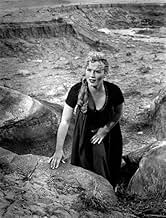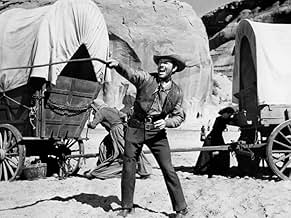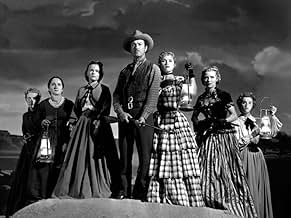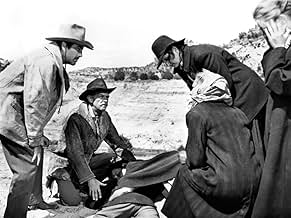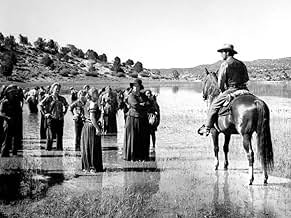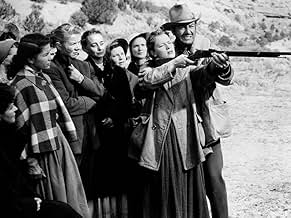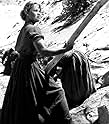IMDb RATING
7.6/10
4.1K
YOUR RATING
A trail guide escorts a group of women from Chicago to California to marry men that have recently begun settling there.A trail guide escorts a group of women from Chicago to California to marry men that have recently begun settling there.A trail guide escorts a group of women from Chicago to California to marry men that have recently begun settling there.
- Director
- Writers
- Stars
- Awards
- 2 wins total
Claire Andre
- Pioneer Woman
- (uncredited)
Raymond Bond
- Preacher
- (uncredited)
Polly Burson
- Pioneer Woman
- (uncredited)
Archie Butler
- Outrider
- (uncredited)
Claire Carleton
- Flashy Woman
- (uncredited)
Bill Cartledge
- Outrider
- (uncredited)
Mary Casiday
- Pioneer Woman
- (uncredited)
- Director
- Writers
- All cast & crew
- Production, box office & more at IMDbPro
Featured reviews
I thoroughly enjoyed this film about a group of women being led by Robert Taylor's character to their new town. They are a motley bunch but pull together when the men desert them to travel and start a new life with the men they have chosen to be their husbands. Robert Taylor is fantastic as the man being taken to take them through, even though he believes it to be an impossible task. There are some genuinely touching moments in this movie, I had to have my tissues handy in places, but it is well worth a watch. One of the best Westerns I have seen and even better because the women have the chance to take centre stage for a change.
I've seen this movie several times on the late-late show and have enjoyed it each time. What a great portrayal of women and how they had the courage and fortitude to go where they perhaps had a chance for a new life. Hardships galore, inner strengths found, new love. The women (especially the older gal) were wonderful and showed us how difficult it must have been to take on such a dangerous trip across the country. Everything possible happened to them yet they still kept their determination alive to reach their destination. Proud and glorious movie.
A brilliant slice of pioneer-era Americana. In no other movie that comes to mind was there such a realistic portrayal of the Old West and its numerous perils than in this faithfully told story of pioneer women crossing the harsh western U.S. wilderness of 1850 from Missouri to California.
The ladies are responding to an ad placed by a leader (on behalf of several other men) in a pioneer settlement out in California for wives. These tenderfoot ladies may be looking for husbands, but there's nothing "weak" about them at all. They not only bravely face the hardships, dangers, and tragedies of the journey, but they soon learn how to handle their own with toughness and grit.
The story unfolds clearly due to a finely structured and developed script. The intertwining stories are well told and well acted. The mostly female cast are all strong, and Robert Taylor as "Buck," the guide and leader of the wagon train seems to enjoy the task of having dozens of female leads surrounding him. John McIntyre as the patriarchal Mr. Whitman (who hires Buck) is good, while Buck's friend, confidant, and comic-relief guy Ito is also a well-rounded character.
The ending is one of the most heartwarming ever in a western; this is the kind of movie that can be watched over and over again.
The ladies are responding to an ad placed by a leader (on behalf of several other men) in a pioneer settlement out in California for wives. These tenderfoot ladies may be looking for husbands, but there's nothing "weak" about them at all. They not only bravely face the hardships, dangers, and tragedies of the journey, but they soon learn how to handle their own with toughness and grit.
The story unfolds clearly due to a finely structured and developed script. The intertwining stories are well told and well acted. The mostly female cast are all strong, and Robert Taylor as "Buck," the guide and leader of the wagon train seems to enjoy the task of having dozens of female leads surrounding him. John McIntyre as the patriarchal Mr. Whitman (who hires Buck) is good, while Buck's friend, confidant, and comic-relief guy Ito is also a well-rounded character.
The ending is one of the most heartwarming ever in a western; this is the kind of movie that can be watched over and over again.
John McIntire approaches wagonmaster Robert Taylor with an interesting job and challenge. He wants to bring brides west to the settlement he's founded in the southwest United States. Taylor hires on a bunch of hands to escort the women and issues a no fraternization policy. When one of them tries to rape one of them, he shoots him out of hand. It's the unsettled frontier and as wagonmaster he's the law on that train as much as a captain on a ship at sea. Of course the hands mutiny and strand Taylor, McIntire, cook Henry Nakamura and the women.
This was a perfect western film for the post Rosie the Riveter generation. No reason at all why women couldn't deal with the rigors of a wagon train. Of course it helped to have the formidable Hope Emerson along.
Of course men and women will be men and women and Taylor breaks his own no fraternization policy with Denise Darcel. Of course this is away from the train when Darcel runs off.
William Wellman delivers us a no frills unsentimental western with gritty performances by Robert Taylor and the rest of the cast. In a bow to his colleague John Ford, Wellman does have a courtship dance at the settlement. I liked the use of the fiddle music playing Believe Me With All Those Endearing Young Charms and Drink to Me Only With Thine Eyes. Ford couldn't have staged it better.
Henry Nakamura had made a big hit in MGM's Go For Broke about the Nisei division in Italy. He was a funny little guy, I'm not sure he was even five feet tall. I loved the scene when he and Taylor find a stash of buried liquor and proceed on a toot. This was his last film though, roles for oriental players were hard to come by. I wonder whatever happened to him.
If you like traditional cowboy films, this one ain't for you, but given the constraints of 19th century society for the role of woman Westward the Women is quite a revelation.
This was a perfect western film for the post Rosie the Riveter generation. No reason at all why women couldn't deal with the rigors of a wagon train. Of course it helped to have the formidable Hope Emerson along.
Of course men and women will be men and women and Taylor breaks his own no fraternization policy with Denise Darcel. Of course this is away from the train when Darcel runs off.
William Wellman delivers us a no frills unsentimental western with gritty performances by Robert Taylor and the rest of the cast. In a bow to his colleague John Ford, Wellman does have a courtship dance at the settlement. I liked the use of the fiddle music playing Believe Me With All Those Endearing Young Charms and Drink to Me Only With Thine Eyes. Ford couldn't have staged it better.
Henry Nakamura had made a big hit in MGM's Go For Broke about the Nisei division in Italy. He was a funny little guy, I'm not sure he was even five feet tall. I loved the scene when he and Taylor find a stash of buried liquor and proceed on a toot. This was his last film though, roles for oriental players were hard to come by. I wonder whatever happened to him.
If you like traditional cowboy films, this one ain't for you, but given the constraints of 19th century society for the role of woman Westward the Women is quite a revelation.
I've seen this film two or three times. I loved to see these courageous and valiant women fighting their way through the West (crossing mountains and deserts and fighting off hostile Indians). One of my favorite moments is the fight between two girls, after one has broken the other's glasses. No rolling on the floor screaming, scratching and pulling each others hair - no, THESE girls use their fists and give each other many a punch in the mouth. Hope Emerson does a great job, too. Oh yes, and Robert Taylor was also in it! O.K., that was a joke, Taylor is quite good as the Scout, who has to guide the women to California, but these women are the real stars of this film!
Did you know
- TriviaWhen this film was broadcast on Spanish TV in 1985, in a remote mountain village near the French border where most of the inhabitants were male it inspired them to place an ad in some papers, requesting potential female partners from all over the country to come and marry the lonely country boys. As a result, a caravan of coaches loaded with dozens of young women from all over Spain turned up at the village for the blind date, and that day many of those lonely boys found the women of their lives.
- GoofsDuring a shooting lesson one of the men tells one of the women to "aim low that will make up for the recoil". When shooting a gun the bullet has long left the barrel, before the barrel begins to move in recoil. Aim low and you'll miss low.
- Quotes
Patience Hawley: [to the awaiting bridegrooms] You can look us over, but don't think you're going to do the choosing! All the way from Independence, I've been staring at two things: one was this picture and the other was the rump of a mule... and don't ask me which was prettier!
- Crazy creditsThe MGM lion, instead of roaring, is frozen in place.
- Alternate versionsAvalable in a colorized version on home video from Turner/MGM Home Video. Like many colorized versions of films, it was not authorized nor approved by anyone who worked on the film.
- ConnectionsFeatured in TCM Guest Programmer: Paul Aguirre (2007)
- SoundtracksTo The West! To The West!
By Henry Russell
- How long is Westward the Women?Powered by Alexa
Details
Box office
- Budget
- $2,203,000 (estimated)
- Runtime1 hour 58 minutes
- Color
- Aspect ratio
- 1.37 : 1
Contribute to this page
Suggest an edit or add missing content



